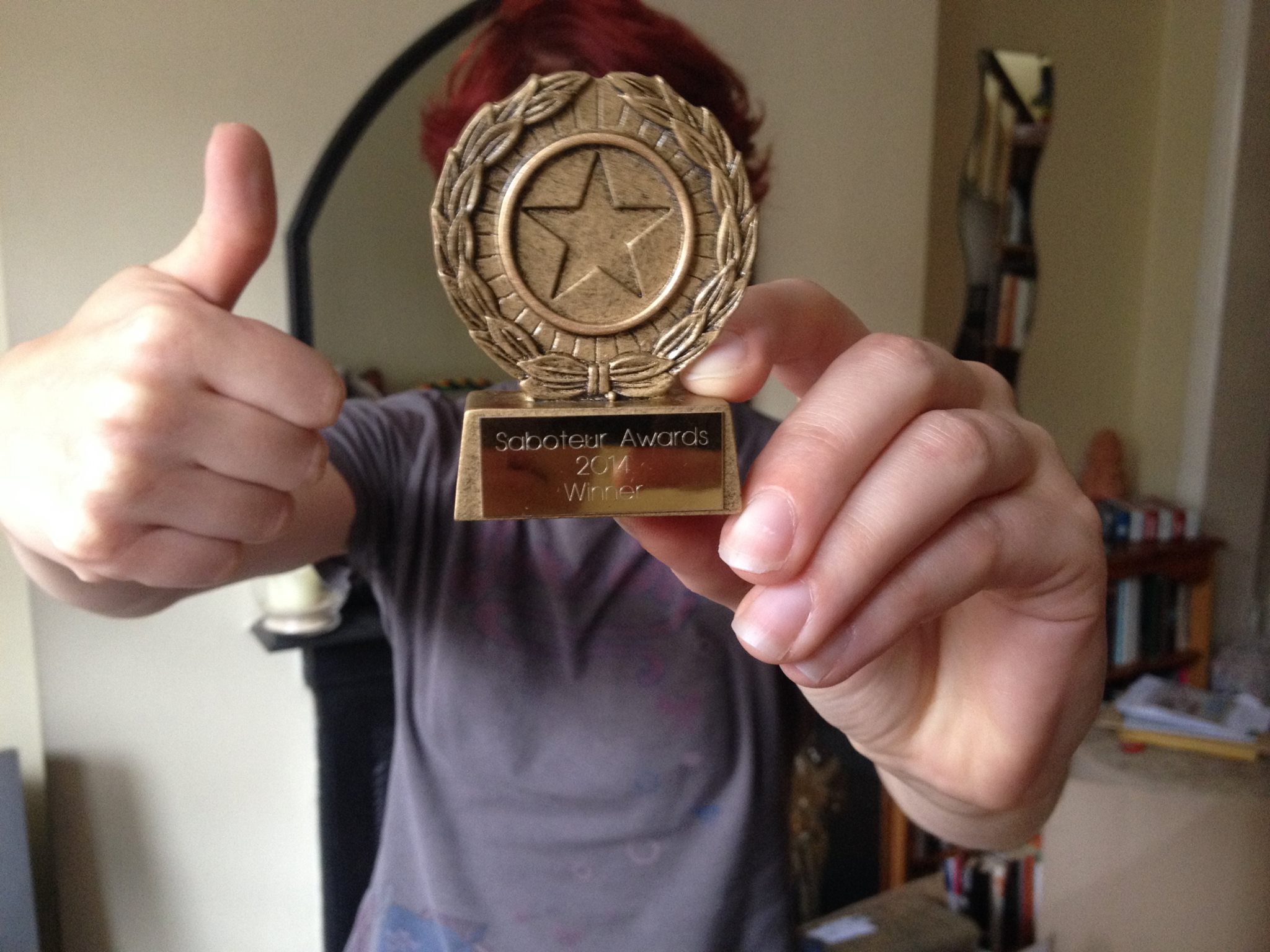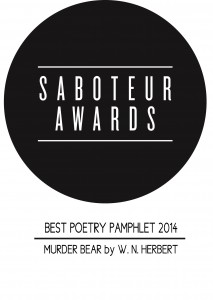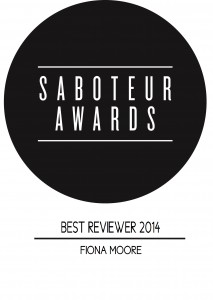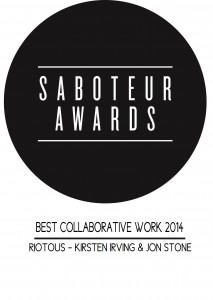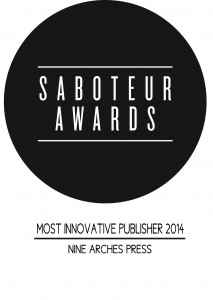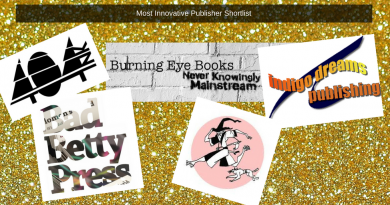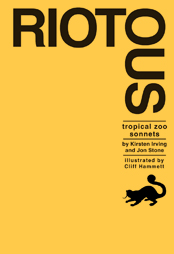Saboteur Awards 2014: Published Poetry
-In which Claire Trévien sums up the categories she presented at the awards-
Best Poetry Pamphlet
The poetry pamphlet was a very strong field pitting début pamphlets by rising stars such as Harry Man, Kathleen Bell and Rebecca Tamás against veterans Lisa Matthews, and W.N. Herbert. Kathleen Bell’s At the Memory Exchange, was described by one voter as a ‘moving meditation on mortality, lives lived, memory, death rituals, migrants & other humans, loss’. Man’s Lift was praised for its ‘clever twinning of past and present, real life and fantasy. Reclaiming attention for poetry with humour and soul.’ Tamás’s The Ophelia Letters was described by one voter as ‘Genuinely original poetry that not many other people are doing at the moment. A lot of quite strange, innovative use of imagery and some very beautiful moments.’
Lisa Matthews stormed ahead in the last week to claim the runner-up slot, with her pamphlet 14, termed by one voter ‘a beautifully controlled almost-narrative. The imagery imprinted itself on my brain after the first read and I keep coming back to it.’
However, it was W.N. Herbert’s ‘mirthful, grim and audibly funny’ pamphlet Murder Bear that triumphed. Published by Donut Press, this pamphlet appealed to voters both as an object and for its content. The pamphlet was described by voters in the following terms:
Because it is a ravishing looking pamphlet, in which W.N. Herbert’s witty theatrics are a bear-based carousel of macabre hilarity!
This is the work of a poet with an astounding linguistic agility. Thrilling and extraordinary, the poems in this pamphlet serve as a weird but undeniable demonstration of W.N. Herbert’s tremendous poetic gifts.
Murder Bear forced me to vote :(
Best Reviewer
This was a new award and one that was particularly close to my heart. Reviewers do an incredible amount of work, often for free, and I wanted an award to thank them, not just for the work they have done for Sabotage Reviews but for other publications at large too. All five people on the shortlist have reviewed for Sabotage now, and I can personally vouch for their integrity, dedication and original thought.
David Coates dominated the shortlist for a large part of the month, and I was quite sure he was going to win. His ‘sharp, incisive, kind but critical’ reviews have struck a chord with a large portion of the poetry scene; one voter described him as the ‘most fearless reviewer I’ve read for ages, with a knack for a phrase and no agenda, who doesn’t see poetry as a web of power relationships but something worth reading for pleasure.’ Also on the shortlist was Rosie Breese, who was praised for her review of Rainn, and the difficulty of the texts she tackles, which ‘most would shy away from’. Charles Whalley’s serious essays on the impact of the internet on poetry came in for particular praise, with voters commending him for going ‘beyond an assessment of the book in question to address the bigger issues.’
In the end, Afric McGlinchey claimed the runner up spot, with voters admiring her ‘consistently balanced and insightful’ reviews written in a ‘clear, concise and accessible’ style that ‘make her reviews a pleasure to read’. On voter wrote that she is a ‘great poet, great reviewer, is alive to reading and reviewing because of her own work and the workshops she facilitates’.
The winner was Fiona Moore, who reviews for various publications as well as on her own blog. She is also famous for conducting gender audits on the big five publishers of poetry, and in prizes. Here is what voters had to say:
Fiona is an unusually sensitive reviewer who is a master of both prose and poetry. She is also totally fair-minded with no personal axe to grind which makes her almost unique.
She tries to make the poetry world a fairer place. Her reviewing is good, but I have particularly appreciated her ‘audits’ and I hope she does more of them.
Fiona Moore is a consistently balanced, insightful and generous reviewer.
Always a considered, accessible, thought-provoking review. Fiona chooses a range of subjects, considering poetry from different perspectives and is un-afraid to voice an thoughtful, knowledgeable opinion.
Best Collaborative Work
This was also another new award to celebrate collaborative endeavours, and the contenders were incredibly varied from herbal remedies, to explorations with technology to the alliance of cartoons with poetry. The runner-up, a collaboration between poet Daniel Cockrill (of Bang Said the Gun fame) and cartoonist Tony Husband, Sellotaping Rain to my Cheek, was described as ‘an understated delivery of really moving and funny depictions of situations with which everyone could empathise – but probably wouldn’t unless taken gently by the hand to look at them’. Another voter commented that ‘Tony Husband is a one of the UK’s great cartoonists and collaborating with Daniel Cockrill has to make for some innovative and quirky work.’
Penned in the Margins appeared twice on this shortlist, first with SJ Fowler’s Enemies: the Selected Collaborations of SJ Fowler, and then with its collaboration with Mercy, Electronic Voice Phenomena. On SJ Fowler, one voter commentated: ‘Would love to see Steven Fowler get some recognition here – he’s done an enormous amount to promote other poets (as poetry editor of 3:AM and the man behind the Maintenant series) and his own work deserves an award or two!’, while his work was deemed ‘an innovation in experimental poetic collaboration’. Electronic Voice Phenomena was described by one voter as ‘weirdly wonderful. Not afraid to experiment and do it with excellence and success’, while another said ‘Awe inspiring. Willing to take risks. Pushing the boundary and setting the bar to aspire to for us lesser mortals even higher. A fine piece of art to be devoured again and again.’ Previously shortlisted in the Ted Hughes Awards Chris McCabe and Maria Vlotides’s Pharmapoetica: a dispensary of poetry was praised by one voter as a ‘unique and moving collaboration distils and bottles the best aspects of poetry and herbal remedies. A journey back to the earthy roots of medicines and human relationships.’
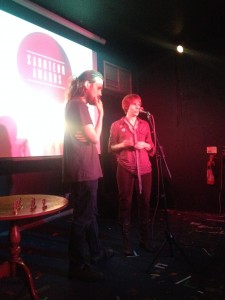
In the end fauna prevailed with Riotous,a collaboration between Kirsten Irving and Jon Stone, with illustrations by Cliff Hammett, claiming the trophy. These ‘imaginative and original’ 29 sonnets based on the animals rescued by the Tropical Zoo, were described as ‘impressive’, ‘well-crafted’ and ‘satisfying’. Other voters added:
They made huge forays into the whole idea of collaborative ventures — lots of others have followed. And they are brilliant.
The presentation of this work is second to none.
Most Innovative Publisher
Another strong shortlist recognizing the important work done by small presses to promote literature. Sidekick Books were described by one voter as ‘Consistently innovative, erudite, fun and fabulous – they’re taking poetry to places others would never think of charting’. Red Squirrel Press were celebrated for casting the net wide and supporting poetry in the North East of England, one voter commented that they are ‘Brilliant small publishing firm who deserve great acclaim for the quality of work they bring out in very tough times’. Burning Eye Books also came in for some vigorous praise: ‘No-one else is so clearly identified with publishing uncompromisingly good spoken word – Burning Eye genuinely does something unique, and has really high production values too.’
Last year’s winner, Penned in the Margins, was runner-up this year. One voter applauded them for their: ‘exceptional quality literature and performance and for an indie press they are really competing with the big boys because they know how to organise, edit, publicise and creatively approach risk taking poetry’.
However, the winner this year was Midlands-based Nine Arches Press, run by the indefatigable Jane Commane. Voters admired their energy and approachability, and their engagement with the wider community.
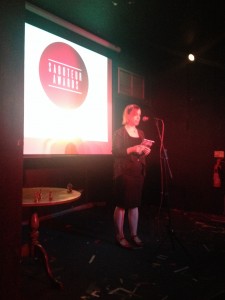
I was hard pushed to choose stand out comments, but here are a few:
Nine Arches Press is launching a series of stunning debut collections this year. They are not afraid to push beyond the boundaries of form, genre and even the institution of literature itself. A great supporter of emergent and established talent, especially in the Midlands area.
Lively design, excellent publicity, very professional yet open to newcomers, and never stuffy when dealing with people.
Because they’ve persevered for 5 years now, publishing new poets and believing in them, fostering and encouraging them from debut to more substantial collections. And alongside that they publish “Under the Radar” magazine, where new writers can see themselves in print, and run events all over the Midlands and beyond.
So that’s it for my round-up, expect similar accounts soon from James Webster and Richard T. Watson!

